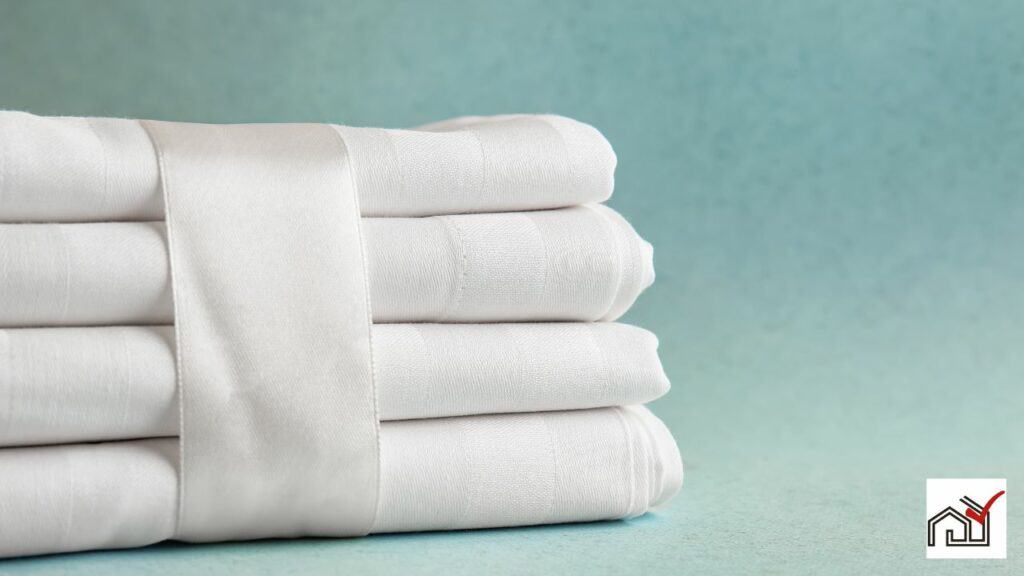Fitted sheets should be changed weekly for cleanliness and health. They collect sweat, oils, and skin cells, which can lead to bacteria and dust mites, potentially affecting allergies and sleep quality. Adjust the frequency if you have skin conditions, allergies, or live in a humid climate.
Washing sheets properly also maintains a clean sleep area and extends the life of the bedding.
Understanding Sheet Hygiene
Dr. Browning emphasizes the need to change bed sheets regularly for good hygiene and to avoid health issues from dust mites and allergens. Dead skin cells on sheets feed dust mites, which can cause discomfort, worsen allergies, and induce skin rashes. Frequent washing of sheets is necessary to reduce these risks.
Sleeping leads to dirt and sweat on sheets, and if not cleaned, they can become a breeding ground for bacteria and fungi. This can affect sleep quality and health. Sheets should be washed in hot water for 10 to 13 minutes to kill bacteria.
People with allergies or those who sweat a lot at night, as well as pet owners, might need to wash their sheets more often to remove dander and allergens. Using a bug-killing detergent is advised for thorough cleaning.
Following these practices can lead to better sleep hygiene, lower health risks, and a more comfortable sleep.
The Role of Dust Mites
Dust mites are small organisms that live in bedding and feed on human skin cells. They can cause allergies, leading to symptoms such as sneezing, nasal congestion, and itchy eyes. These symptoms can be more severe in people with asthma or other respiratory issues.
To reduce dust mites, it is advised to wash bed sheets in hot water every one to two weeks. Regular washing of sheets not only removes skin cells but also improves airflow and cools the bed, making it less suitable for dust mites. Clean sheets help lower the amount of allergens in the bedroom, which can alleviate nasal congestion and other allergic reactions.
A consistent sheet-washing routine can ensure a cleaner and healthier sleep environment, reducing discomfort and skin irritation.
Skin Cells and Sweat Factors
Skin cells and sweat accumulate on bed linens, necessitating regular sheet changes. While sleeping, individuals shed skin cells and sweat, which can attract bacteria and dust mites, potentially affecting both bedding lifespan and personal health.
Individual differences in shedding and sweating rates depend on factors like body temperature, room climate, and health. Increased heat or sweating requires more frequent sheet changes to keep the sleeping area clean.
It is advised to change bed sheets at least every two weeks to prevent bacterial and mite growth. Regular laundering removes these contaminants, improves airflow, and ensures a comfortable sleep.
Seasonal Considerations
Seasonal changes affect how often to change fitted sheets for cleanliness. In winter, despite less sweating, sheets should still be changed weekly due to the continual build-up of dead skin cells and dirt. A minimum of changing sheets every two weeks is essential to prevent an unclean sleeping area and skin issues.
During summer, changing sheets every three days is advisable because of increased allergens like pollen that can worsen allergies. Even if personal hygiene practices, such as showering at night, might extend the cleanliness of sheets, high levels of summer allergens may require more frequent washing.
While sheets may only need replacing every one to two years, the frequency of washing them should be consistent throughout the year to maintain a hygienic and allergen-free sleep environment, crucial for good sleep and health.
Sheet Changing Frequency Guidelines
Health experts recommend changing fitted sheets weekly to maintain a clean sleeping environment and prevent dust mites, bacteria, and allergens. Ideally, sheets should be washed every week, or at most every other week, to avoid accumulation of sweat, skin cells, and irritants that can disrupt sleep and worsen allergies or skin conditions.
Seasonal changes can affect sheet changing frequency. In summer, increased hay fever and pollen suggest more frequent washing, while in winter, the interval may be slightly longer. However, weekly changing is still advised for cleanliness.
Despite recommendations, many delay changing sheets beyond the suggested period, with an average delay of 24.4 days. Single individuals may wait up to 37 days, whereas those in relationships or married change sheets every 19.9 to 21.8 days.
For an allergen-free sleep zone, it's important to combine regular sheet changing with personal hygiene, like showering before bed. Following the advice to change sheets every 7 to 14 days will reduce exposure to irritants and promote better sleep.
Signs You Need Fresh Sheets
You should change your sheets regularly for hygiene reasons. Over time, sheets collect sweat, oils, and dead skin, which can lead to dust mites and allergens. If your sheets smell or feel less breathable, they may be damp with bodily fluids, increasing the risk of bacterial growth.
Stained or discolored sheets are another sign to get new bedding. Stains may contain germs and not always wash out.
If you itch or feel like you're being bitten in bed, mites could be the cause, leading to skin irritation. Changing your sheets frequently helps maintain a clean sleep environment and prevent skin problems.
It's important to watch for these signs to ensure a clean and comfortable sleep.
Proper Sheet Cleaning Techniques
Wash fitted sheets in hot water at 140°F for 10-13 minutes to remove bacteria and mites. Hot water effectively kills allergens and microorganisms on bedding.
Check the fabric care label before washing; cotton can usually handle high temperatures. Use an enzyme-containing detergent for better cleaning. If the fabric is delicate or to save energy, you can wash sheets in cold water with a cold-water detergent.
Dry sheets completely to prevent bacterial growth. Air drying or using a dryer are both acceptable.
Wash hands before handling clean sheets to avoid contaminating them.
These steps help maintain a clean sleeping area and prolong bedding life.
Extending Sheet Lifespan
Proper care can extend the life of fitted sheets, saving money and reducing environmental impact. To maintain sheets, here are some tips:
- Use gentle, eco-friendly detergents instead of harsh chemicals like bleach.
- Wash sheets in lukewarm water to prevent shrinkage and wear.
- Rotate multiple sets of sheets to distribute wear evenly.
- Store spare sheets in a cool, dry place away from sunlight to avoid fabric damage.
- Dry sheets on a low or medium tumble dry setting or line-dry to preserve fabric.
- Fix small tears or loose threads promptly to avoid further damage.
Consistent care helps prolong the lifespan of sheets, ensuring a clean and comfortable sleep environment.




